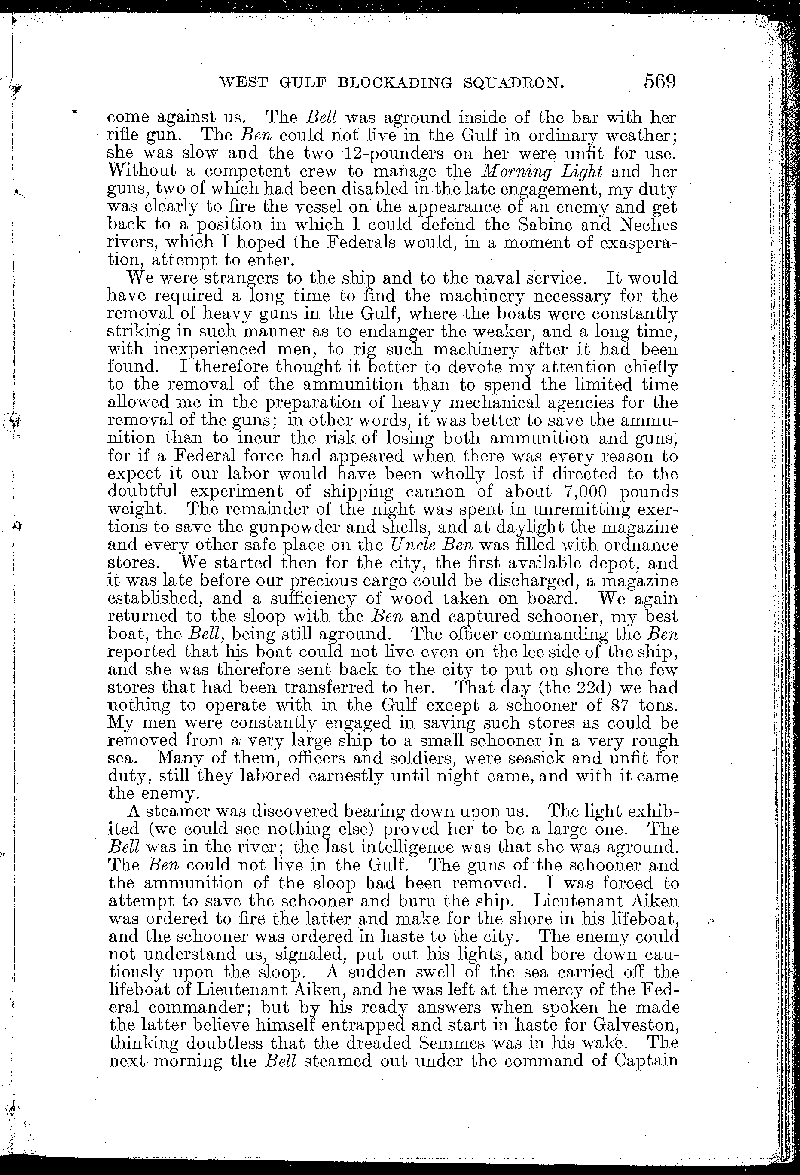
Supplemental report of (Confederate) Major Watkins to Captain E. P. Turner, Assistant Adjutant-General, regarding the capture of the USS Morning Light (Page 3 of 4). This is in Volume 19 of the Official Records of the Union and Confederate Navies in the War of the Rebellion.

Supplemental report of Major Watkins, C. S. Army, commanding on the Sabine River. (Page 3 of 4 pages)
(This report is continued from page 568) come against us. The Bell was inside of the bar with her rifle gun. The Ben could not live in the Gulf in ordinary weather; she was slow and the two 12-pounders on her were unfit for use. Without a competent crew to manage the Morning Light and her guns, two of which had been disabled in the late engagement, my duty was clearly to fire the vessel on the appearance of an enemy and get back to a position in which I could defend the Sabine and Neches rivers, which I hoped the Federals would, in a moment of exasperation, attempt to enter.
We were strangers to the shp and to the naval service. It would have required a long time to find the machinery necessary for the removal of heavy guns in the Gulf, where the boats were constantly striking in such manner as to endanger the weaker, and a long time, with inexperienced men, to rig such machinery after it had been found. I therefore thought it better to devote my attention chiefly to the removal of the ammunition than to spend the limited time allowed me in the preparation of heavy mechanical agencies for the removal of the guns; in other words, it was better to save the ammunition than to incur the risk of losing both ammunition and guns, for if a Federal force had appeared when there was every reason to expect it our labor would have been wholly lost if directed to the doubtful experiment of shipping cannon of about 7,000 pounds weight. The remainder of the night was spent in unremitting exertions to save the gunpowder and shells, and at daylight the magazine and every other safe place on the Uncle Ben was filled with ordnance stores. We started then for the city, the first available depot, and it was late before our precious cargo could be discharged, a magazine established, and a sufficiency of wood taken on board. We again returned to the sloop with the Ben and captured schooner, my best boat, the Bell, being still aground. The officer commanding the Ben reported that his boat could not live even on the lee side of the ship, and she was therefore sent back to the city to put on shore the few stores that had been transferred to her. That day (the 22d) we had nothing to operate with in the Gulf except a schooner of 87 tons. My men were constantly engaged in saving such stores as could be removed from a very large ship to a small schooner in a very rough sea. Many of them, officers and soldiers, were seasick and unfit for duty, still they labored earnestly until night came, and with it came the enemy.
A steamer was discovered bearing down upon us. The light exhibited (we could see nothing else) proved her to be a large one. The Bell was in the river; the last intelligence was that she was aground. The Ben could not live in the Gulf. The guns of the schooner and the ammunition of hte sloop had been removed. I was forced to attempt to save the schooner and burn the ship. Lieutenant Aiken was ordered to fire the latter and make for the shore in his lifeboat, and the schooner was ordered in haste to the city. The enemy could not understand us, signaled, put out his lights, and bore down cautiously upon the sloop. A sudden swell of the sea carried off the lifeboat of Lieutenant Aiken, and we was left at the mercy of the Federal commander; but by his ready answers when spoken he made the latter believe himself entrapped and start in haste for Galveston, thinking doubtless that the dreaded Semmes was in his wake. The next morning the Bell steamed out under the command of Captain (This report is continued on page 570)
This site is sponsored by the Friends of the Old Naval Hospital
Last updated November 9, 2008